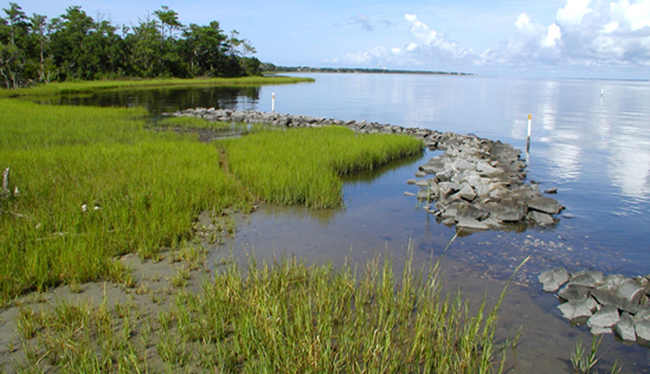New York Great Lakes Basin Small Grants encourage stakeholder-driven ecosystem-based management application
Contact:
David White, NYSG Coastal Recreation & Tourism Specialist, P: 315-312-3042, E: dgw9@cornell.edu
Oswego, NY, March 4, 2019 - In 2018, New York Sea Grant (NYSG) in partnership with the New York State Department of Environmental Conservation (NYSDEC) awarded nearly $200,000 in New York Great Lakes Basin Small Grants (NYGLBSG) funds to projects to advance community and ecological resiliency within New York’s Great Lakes watershed, while supporting water quality improvement and restoration of native wildlife and habitats.
NYSG administers this grants program, now in its fourth year of successfully funding projects that achieve goals of the Great Lakes Action Agenda, as identified by basin-wide stakeholders.
The 2018 NYGLBSG recipients:
Western New York Land Conservancy, East Aurora, NY, $25,000: Enhancing Ecosystem Integrity and Climate Resiliency by Restoring Rare Wetland Seep Ecosystems in the Niagara Gorge.
Measures to control non-native invasive plants add to a larger multi-year effort to restore plant communities throughout the Niagara Gorge.
City of Ogdensburg, Ogdensburg, NY, $25,000: Alternative Solutions for Managing Erosion: Engineered Solutions vs. Nature-Based Approach and the Implications for Access to Waterfront Recreation.
For siting and design of living shoreline features, public discussion re: erosion, flood protection, waterfront access/recreation, risk reduction planning.
Genesee-Finger Lakes Regional Planning Commission, $25,000: Post-Flood Recovery Building Workshop.
Funded a community-driven process for Sodus Point stakeholder groups to begin developing post-2017 flood event resiliency planning.
Onondaga Environmental Institute, Syracuse, NY, $24,987: Improving Aquatic Habitat Connectivity in the Onondaga Creek Watershed for Coldwater Species Restoration in a Changing Climate.
Increasing native and removing invasive vegetation is improving riparian habitat to support sustained brook trout surival plus stream bank stability.
Environmental Finance Center, Syracuse University, Syracuse, NY, $25,000: Creating Community and Watershed Resiliency through Training and Technical Assistance.
For 2 workshops to spur shore-line and upland communities to implement ecosystem-based management (flood resiliency) planning.
Town of Greece, NY, $25,000, Waterfront Infrastructure Resiliency Assessment.
For improving the integrity & operation of waterfront sewer systems, particularly during high water conditions.
The Nature Conservancy, Rochester, NY, $25,000: Salmon Creek/South Avenue Engineering Study.
For current-day hydrologic/hydraulic study regarding flooding attenuation in Village of Hilton and apartment complex area.
St. Lawrence County, Canton, NY, $25,000: Enhancing Shoreline Resilience Along the St. Lawrence River in St. Lawrence County.
For stakeholder-driven assessment of ecosystem vulnerability and resiliency measures to add to city, town and village planning along 40 miles of riverfront.
New York’s GLBSG Program is a project of the state Environmental Protection Fund’s Ocean and Great Lakes Ecosystem Conservation Program.
For More Information: www.nyseagrant.org/glsmallgrants.

New York Great Lakes Basin Small Grants award recipients use funds to address shoreline restoration and resiliency opportunities. Credit: NOAA/Lauren Long.
More Info: New York Sea Grant
New York Sea Grant (NYSG), a cooperative program of Cornell University
and the State University of New York (SUNY), is one of 33 university-based
programs under the National Oceanic and Atmospheric Administration’s
National Sea Grant College Program.
Since 1971, NYSG has represented a statewide network of integrated
research, education and extension services promoting coastal community
economic vitality, environmental sustainability and citizen awareness
and understanding about the State’s marine and Great Lakes resources.
Through NYSG’s efforts, the combined talents of university scientists
and extension specialists help develop and transfer science-based
information to many coastal user groups—businesses and industries,
federal, state and local government decision-makers and agency managers,
educators, the media and the interested public.
The program maintains Great Lakes offices at Cornell University, SUNY
Buffalo, SUNY Oswego and the Wayne County Cooperative Extension office
in Newark. In the State's marine waters, NYSG has offices at Stony Brook
University in Long Island, Brooklyn College and Cornell Cooperative
Extension in NYC and Kingston in the Hudson Valley.
For updates on Sea Grant activities: www.nyseagrant.org has RSS, Facebook, Twitter, and YouTube links. NYSG offers a free e-list sign up via www.nyseagrant.org/nycoastlines for its flagship publication, NY Coastlines/Currents, which is published quarterly. Our program also produces an occasional e-newsletter,"NOAA Sea Grant's Social Media Review," via its blog, www.nyseagrant.org/blog.